ANI Pharmaceuticals, Inc. (NASDAQ:ANIP) is a diversified bio-pharmaceutical company serving patients in need by developing, manufacturing, and marketing high quality branded and generic prescription pharmaceutical products. However, unlike most biopharmaceutical companies, ANIP has yet to publish a pipeline of products under development which would show investors their potential revenue opportunities. In the following I have collected information from various sources to produce ANIP’s pipeline of products which could drive sustainable long-term growth, which is not reflected in ANIP’s current share price.
Purified Cortrophin Gel:
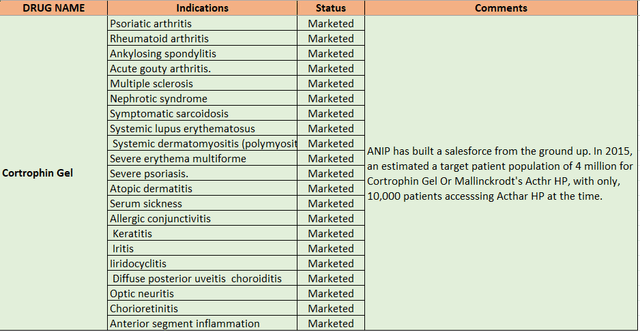
Cortrophin Gel approved indications (Ani Pharmaceuticals )
Partnering with Veeva (VEEV), ANIP has embarked on an intelligence led process in identifying the specific patients for whom standard of care treatments have proven unsuccessful. According to Nikhil Lalwani, ANIP’s CEO, this has improved how they are servicing patients, physicians, and payers, accelerating their launch momentum, and increasing access to Corticotrophin Gel for patients in need. They have dedicated teams currently focusing on rheumatology, neurology, nephrology, and pulmonology and have ramped up peer-to-peer education programs across these targeted specialties increasing awareness of Cortrophin Gel. Over the last eleven consecutive months ACTH therapy, which includes Cortrophin Gel and Mallinckrodt’s (MNK) Acthar HP, has seen year over year growth.
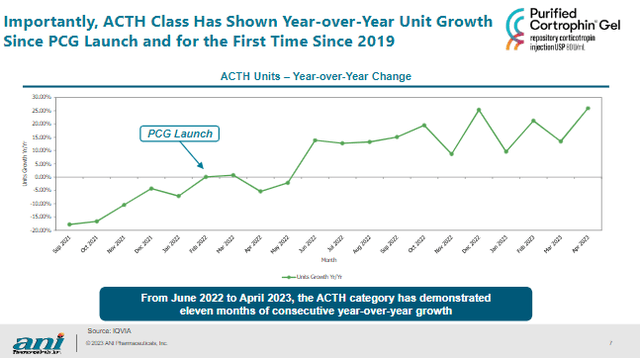
ACTH therapy Year over Year prescription growth (Ani Pharmaceuticals)
This includes double digit year over year growth in the first quarter of 2023, according to IQVA data. ANIP is projecting Cortrophin Gel sales of between $80 million and $90 million for 2023. Their goal is to address the unmet needs of an estimated 4,000,000 patients, as indicated in their September 2015 Corporate Presentation. Though this information has not been updated since 2015, based on revenue reported by both ANIP and MNK, the patient user base for H.P. Acthar and Cortrophin Gel is now likely closer to 20,000.
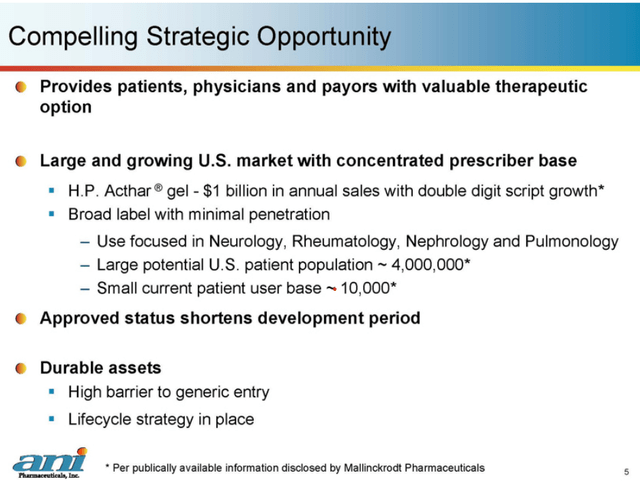
Strategic Opportunity envisioned by ANIP when acquiring Merck’s Cortrophin portfolio (Ani Pharmaceuticals )
Female Testosterone:

Female Testosterone (ClinicaTrials.gov and American Heart Journal)
In 2013, Meridian Venture Capital Partners gave up 43% of ANIP of their company in order to acquire Biosante Pharmaceuticals, arguably to get cash and be listed on a stock exchange. However, this is inconsistent with MVP’s business model, as ANIP is the only public traded stock in their portfolio. Additionally, as a subsidiary of Wells Fargo, at the time, MVP had access to cash, if needed. Historically, MVP invests in private companies. ANIP, the one exception to their investment practice, may finally be ready to expose the full reason for acquiring Biosante Pharmaceuticals.
It has been just over 10 years since Biosante Pharmaceuticals completed the Safety and Efficacy of LibiGel for Treatment of Hypoactive Sexual Desire Disorder in Postmenopausal Women (BLOOM). A study involving 3,656 postmenopausal women at a higher risk of experiencing cardiovascular events. The study was initially designed to prove the safety of testosterone use for postmenopausal women to treat HSDD. However, unpublished findings, only disclosed in patent applications, showed that restoring testosterone to premenopausal levels significantly reduced the risk of cardiovascular events and breast cancer events. Primary outcome for the trial is “the rate of adjudicated, predefined cardiovascular events in LibiGel-treated subjects compared to that of placebo-treated subjects.” No secondary outcomes are listed for the study, though it is listed as a safety and efficacy study.
According to the Clinicaltrials.gov website, only trials with primary completion dates of January 18, 2017, and later must post results within one year of completion or seek an extension giving them an extra year to submit results. A certification request would give them up to two years to post results. Since Biosante Pharmaceuticals completed the trial in December 2012, there was no requirement to post the results, let alone request a delay in posting results.
On October 27, 2021, a request was made to delay submission of results for this trial. It does not identify if it was an extension or a certification request. If an extension to delay posting results had been submitted, the results would have to be posted by October 27, 2022. To date, the results have not been posted, indicating that there is a high probability that a certification request was submitted to delay posting the results until October 27, 2023. A certification delay is usually given when a New Drug Application has been, or will be, submitted to the FDA. In this case for the first approved female testosterone drug in the US. More details on this can be found in my previous article titled 2023 A Big Year For Testosterone: AbbVie And ANI Pharmaceuticals Best Positioned To Benefit.
In the short video titled, “What is Libigel?”, Dr. Irwin Goldstein, M.D. , the Director of the Sexual Medicine Program at Alvarado Hospital, made an interesting disclosure about the Libigel development program led by Dr. Michael Snabes, who is currently a Senior Medical Director, AbbVie Global Clinical Research and Development . Goldstein quotes Dr. Snabes as saying, “Okay, if the FDA wants 10 years of data, we are going to do 10 years of data”. Dr. Goldstein further adds, “the cool part of the trial was that with over 1,000 participants registered and three years of data, they have a cardiovascular risk rate far lower than the general population. The women we are studying are women with diabetes, hypertension, who are smoking and older women, where these events of heart attacks, breast cancer and strokes would happen”.
Patent applications reveal that in 2011, Dr. Snabes discovered that restoring testosterone levels to premenopausal levels, reduced the risk of cardiovascular events in postmenopausal women, at a higher risk of experiencing one, by at least 70%. Additionally, in December 2015, it was revealed that Dr. Snabes’ invention discovered that in restoring testosterone to the women in the study they reduced breast cancer risk by an undisclosed amount.
According to the clinical trial history, the last enrolled patient would have completed 10 years of observation between April and June of 2021. Approximately four months later, the certification request was submitted. This is nine years after the primary completion of the trial in October 2012. Interestingly, Dr. Snabes, went directly from Biosante Pharmaceuticals to AbbVie. If AbbVie completed the post trial observations, the results could reflect up to 36,560 patient years of data.
Female testosterone has the potential of being a blockbuster franchise drug with multiple indications, overtime. The benefit to ANIP will be measured by the deal they have in place. Upon merging with Biosante Pharmaceuticals, ANIP’s intention was to seek a co-promotion deal in the US and receive royalties for ex-US sales. According to Biosante Pharmaceuticals January 2011 presentation titled Biosante and Libigel Market Overview, four million off-label or compounded testosterone prescriptions were issued to treat Female Sexual Disfunction, estimating a potential market of nine million prescriptions when an FDA approved product hits the market. According to a March 11, 2011, CEO-CFO interview, Biosante Pharmaceuticals’ CEO, Stephen Simes, stated that “doctors already are prescribing and women already are using testosterone for sexual dysfunction, and the 4 million prescriptions depending on the pricing would result in a $1 to $2 billion potential for LibiGel.” This equates to a potential $2.25 billion to $ 4.5 billion opportunity, when considering the target of nine million prescriptions Biosante Pharmaceuticals identifies in their 2011 presentation, for the United States alone. This did not include potential revenue for additional indications. The latest globally accepted guidelines in using testosterone to treat HSDD, recommends ruling out other treatments options before prescribing testosterone. Therefore, the estimated 4 to 9 million prescriptions, will be lower. However, this will be offset by increasing prices of hormonal drugs since 2011 and does not consider any additional indications.
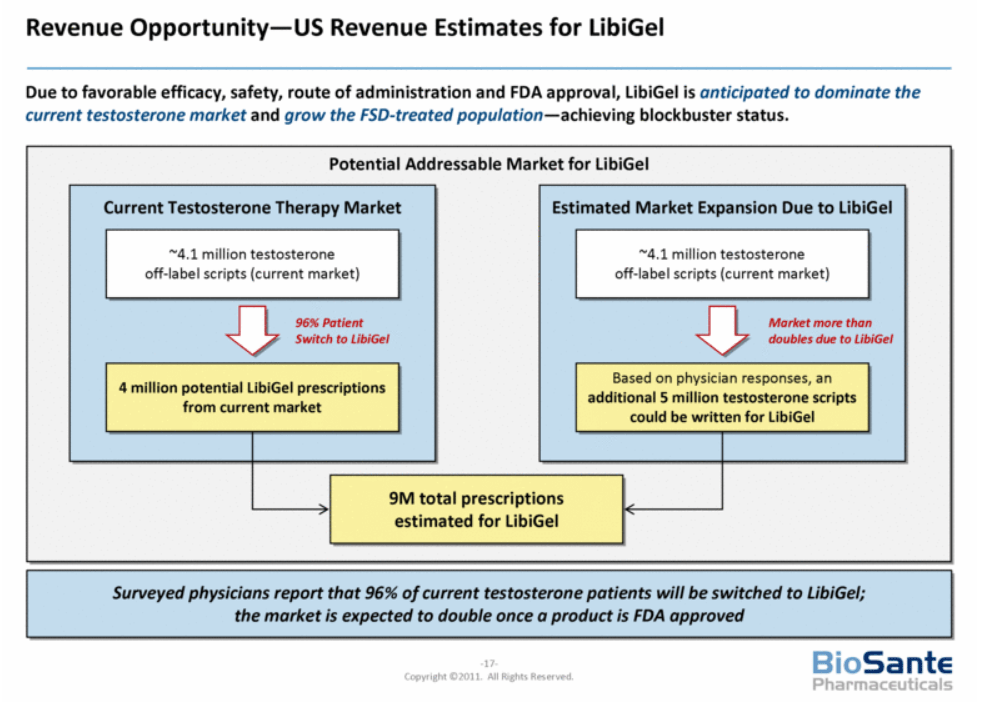
Market opportunity for an FDA approved female testosterone drug (Biosante Pharmaceuticals – now Ani Pharmaceuticals)
Importantly, 96 percent of physicians surveyed indicated that they would switch immediately to an FDA approved testosterone drug.
Currently, Androfeme is the only commercially available testosterone drug for women, approved only in Australia. However, it lacks the long-term safety data required by the FDA for approval in the US.
Cortrophin-Zinc

Cortophin-Zinc Indications (Tabletwise.net)
When ANIP acquired Cortrophin Gel from Merck, they also acquired Corticotropin-zinc Hydroxide. A drug which was previously approved by the FDA for use in treating Ulcerative colitis, Colonic disorders.
The process to bring this drug back to market is like the process used for ANIP to bring Cortrophin Gel back to market. The lessons learned in getting Cortrophin Gel approved, make it highly likely ANIP will be successful in getting Cortrophin-zinc approved. If approved, it would be the only Cortrophin-zinc on the market and would tuck in nicely within their existing rare disease infrastructure.
Three Potential 505(b)(2) NDA drugs to add to ANIP’s long term revenue growth
To date, ANIP has given little detail regarding the three 505(b)(2) NDA drugs it inherited when ANIP acquired Novitium Pharmaceuticals. According to ANIP’s 2023 10-Q filing dated May 8, 2023, they expect to bring at least one drug to market by 2024 and fully paying the earnout payments from profits by 2029. They appear to see value by focusing on oral liquid/solutions and providing better forms of existing drugs. The oral liquid solutions target patients which have difficulty in swallowing oral tablet or capsule forms of the drug. According to Evaluating Dysphagia, 7 to 10 percent of adults over 50 experience dysphagia (difficulty in swallowing). Additionally, 25% of hospitalized patients and 30%-40 % of those in nursing homes have dysphagia.
The following are a list of drugs, I believe, that ANIP will be seeking NDA approval within the coming years starting as early as 2024 all with, or seeking, patent protection to 2041 and beyond and the potential revenue they could generate.
Oral Liquid Terazosin

Oral liquid terazosin (Google Patents)
It is likely that ANIP anticipates getting an oral liquid form of terazosin approved and launched by 2024. If approved, arguably, it could generate annual sales of between $166 million and $250 million, with patent protection to 2041. Assuming that it will sell for between $100 and $150 per prescription, while capturing 5% of the alpha blocker market in the US.
On January 18, 2022, the USPTO granted Novitium Pharmaceuticals, led by Muthusamy Shanmugam, a patent for a novel stable oral liquid composition of terazosin and its pharmaceutically acceptable salt, which is used for treating symptomatic benign prostatic hyperplasia (BPH) and hypertension. This patent expires on February 2, 2041. According to the patent, BPH affects approximately 70% of males over the age of seventy. Terazosin hydrochloride is also used in the treatment of hypertension. Marketed terazosin hydrochloride is currently only available in tablet and capsule form, which have lower dissolution rates. This can lead to a decrease in patient compliance, especially for patients that are elderly, bed-ridden, including those who are dysphagic. If approved, this is the patient group ANIP is likely target. This form also allows for improved dosage accuracy when administering the drug to paediatric, geriatric, and patients with feeding tubes and where doses are calculated according to the patient’s weight.
Terazosin is an alpha blocker, where according to ClinCalc.com data, in 2020 the top five alpha blockers sold over 32.72 million prescriptions in the US, with prescriptions ranging between $93.44 and $15.53 generating over $1.58 billion in sales. These five drugs currently only come in capsule or oral tablet form. This creates a significant opportunity for ANIP as the only commercial manufacturer of an oral liquid alpha blocker.
Carglumic Acid:

Carglumic Acid Drug indication (Google Patents )
According to Fact MR, globally, the carglumic acid market size is estimated to grow from $152.3 million in 2023 to $314.4 million in 2033, with treatment of hyperammonemia driving this growth.
On April 18, 2023, the USPTO granted Novitium Pharmaceuticals, led M. Shanmugam, a patent for a tablet for oral suspension comprising carglumic acid and its use with patent protection until June 14, 2042. According to the patent, carglumic acid is used to treat N-acetyl-glutamate synthase (NAGS) deficiency, which is an exceedingly rare, inborn error of metabolism. NAGS deficiency is the rarest congenital urea cycle disorder, which results in a severe defect of ammonia detoxification, which in most cases rapidly becomes lethal. The estimated prevalence of NAGS deficiency is 0.00125 per 10,000 persons.
The value proposition for Novitium’s form of carglumic acid is that it significantly extends the shelf life for the drug and makes it easier to store, over currently approved carglumic acid drugs. This is especially important when considering that Carbaglu, the reference drug, as of November 2022, was ranked among the top 10 most expensive drugs. According to Carbaglu prescribing information, it should be stored in the original, unopened, container under refrigerated conditions. Any unused tablets should be discarded one month after opening the bottle and stored at room temperature. Whereas, Novitium’s tablets have two-year shelf life when stored at 25° C.±2° C. and 60% relative humidity. Additionally, once the bottle is opened, the drug can be used for 90-days or more, while storing it at a temperature of 25° C. to 30° C. The bottle can may be opened and closed, as required.
Note: Eton Pharmaceuticals (ETON) currently sells a generic version of Carbaglu developed and approved by Novitium Pharmaceuticals with royalties going to ANIP.
ANIP’s second 505(b)(2) drug submission will likely be a new form of carglumic acid, which could gain significant market share, due to its improved storage capabilities and reduced waste over existing carglumic acids.
Hydrochlorothiazide

Hydrochlorotiazide indications (Google Patents)
According to ClinCalc data, in 2020, Hydrochlorothiazide was the US 11th best selling drug with 41,476,098 prescriptions being filled at an average of $7.76 per prescription, for a total of $321,854,520 in sales. Hydrochlorothiazide is a diuretic, where in 2020, the top three diuretics sold 72,970,235 prescriptions generating $706 million in revenue.
On December 9, 2021, Novitium, led by M. Shanmugam, filed a patent application, which is currently under review, for a powder for oral suspension and a reconstituted product comprising highly pure hydrochlorothiazide, used to treat hypertension and edema. Novitium already holds a patent for this drug in India. If approved, it should give them patent protection until at least December 9, 2041.
The value proposition for ANIP is that this form of hydrochlorothiazide is targeting the segments of the population that have difficulty ingesting and swallowing solid oral dosage forms such as tablets and capsules particularly pediatrics and geriatrics, as well as hospitalized patients that may require a feeding tube. They argue that there is a need for a safe, pharmaceutically elegant, and stable hydrochlorothiazide liquid compositions that may be adapted for administration to certain patient populations that overcome the drawbacks with solid pharmaceutical compositions.
ANIP’s Potential Candidates for Receiving Royalties and Milestone Payments

Potential Royalties for Drugs in Phase 3 trials (CG Oncology and Pantarhei Bioscience)
ANIP once owned 19.9 % of CG Oncology, when Biosante Pharmaceuticals spun off CG0070 after acquiring Cell Genesys. That spin off is now known as CG Oncology. ANIP’s stake in the company has been diluted significantly over the years and it is unknown how much of the company they currently own. However, they are still in line for milestone and royalty payments if approved and marketed.
ANIP under Biosante Pharmaceuticals out-licenced an Androgen Restoration Contraceptive (ARC) pill to Pantarhei Bioscience which is currently being advanced by Gedeon Richter (US and Asian territories are still available for out-licencing by Pantarhei Bioscience). According to Pantarhei’s pipeline page ARC is now in phase III trials and based on scientific advices obtained from regulatory authorities (EMA and FDA), only a limited phase III program is required. ANIP maintains all rights to a transdermal version of the drug.
February 4, 2013, Aduro BioTech announced the acquisition of the GVAX portfolio of drugs from Biosante Pharmaceuticals for $1 million and future royalty and milestone payments, if commercialized. On October 20, 2020, Chinook Therapeutics announced closing their merger with Aduro Biotech. Chinook Therapeutics (KDNY) is currently in the process of being acquired by Novartis AG (NVS). The following is a list of drugs currently in clinical trials for which, at some point, Novartis may own and ANIP may receive royalties and milestone payments from the GVAX asset.
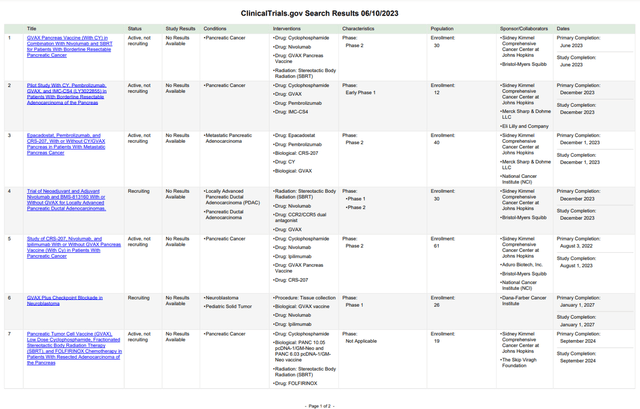
Current clinical trials involving GVAX that may eventually produce royalties for ANIP (clinicaltrials.gov )
Nuray Chemicals Pvt Ltd’s tafamidis likely to be in-licenced.
In ANIP’s 2023 first quarter earnings conference call the CEO stated they were seeking assets to leverage the rare disease infrastructure they have built. Nuray Chemicals Pvt. Ltd.’s tafamidis is likely to be one of those assets. Especially since, Muthusamy Shanmugam, ANIP’s Head of Research & Development and Chief Operating Officer of New Jersey Operations, directly and indirectly owns 1,335,027 shares of ANIP. He is also, a founder of Nuray Chemicals and Novitium Pharmaceuticals. Novitium is Nuray Chemical’s largest customer.
On May 16, 2023, ANIP announced the closing of their public offering which, according the 424B5 filing, netted them $80.6 million after expenses. I believe one of the drugs to be in-licenced or acquired will be Nuray Chemical’s dosage forms of tafamidis. Tafamidis and tafamidis meglumine are currently available as soft gelatin capsule form in United States, Europe and other markets, as Pfizer’s Vyndamax and Vyndaqel. In 2022, the tafamidis family of drugs generated sales of $1.25 billion in the US and $2.45 billion globally. In the first quarter of 2023, the drugs generated sales of $384 million in the US, and $686 million, globally. Pfizer’s patents expire April 27, 2024, but have data exclusivity for treatment of the cardiomyopathy of wild type or hereditary transthyretin-mediated amyloidosis in adults to reduce cardiovascular mortality and cardiovascular-related hospitalization, until May 3, 2026.
On April 18, 2023, the USPTO granted Nuray Chemicals, led by Shanmugam, a patent for new dosage forms of tafamidis and its pharmaceutically acceptable salt thereof, which is valid until November 18, 2041. The value proposition, for ANIP, is that Nuray Chemicals’ version of tafamidis, unlike Pfizer’s drug, will not form a rigid gel upon contacting with water or buffer solution in dissolution. This creates an opportunity for ANIP to bring the only oral solution of tafamidis and tafamidis meglumine to market. According to the Orange Book, Pfizer has the only FDA approved tafamidis drug.
Potential Risk
As with any drug under development, there is no guarantee that any of these drugs will make it to market, or that they will achieve revenue estimates. ANIP could face patent related litigation in relation to advancing these drugs. This could delay or scuttle the development of the affected drug. In relation to Tafamidis, there is no guarantee that he will in-licence the product. However, with Shanmugam’s stake in both Nuray Chemicals and ANIP, a deal between the two makes the most sense.
Conclusion
The pipeline of products outlined in this article point to ANIP’s potential for sustained above average growth through 2041. Aside from Corticotrophin gel, ANIP has not mentioned the assets listed in this article, being products under development. Therefore, this information is not reflected in ANIP’s share price, making ANIP a good buying opportunity for investors looking for hidden value.
Read the full article here




